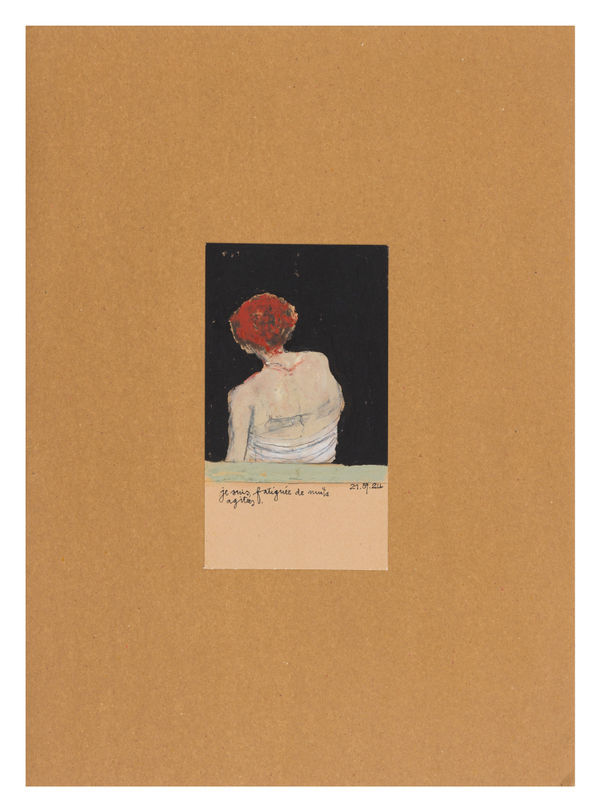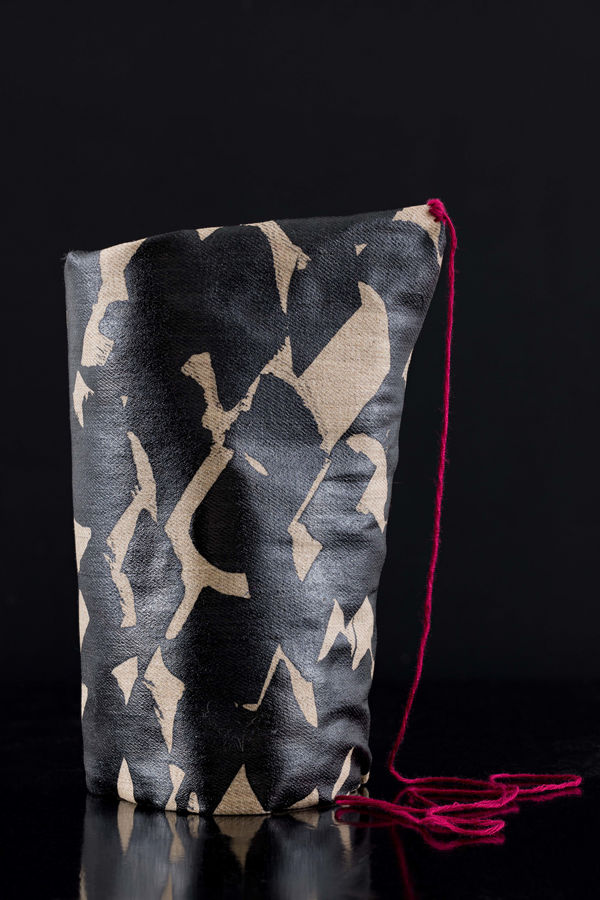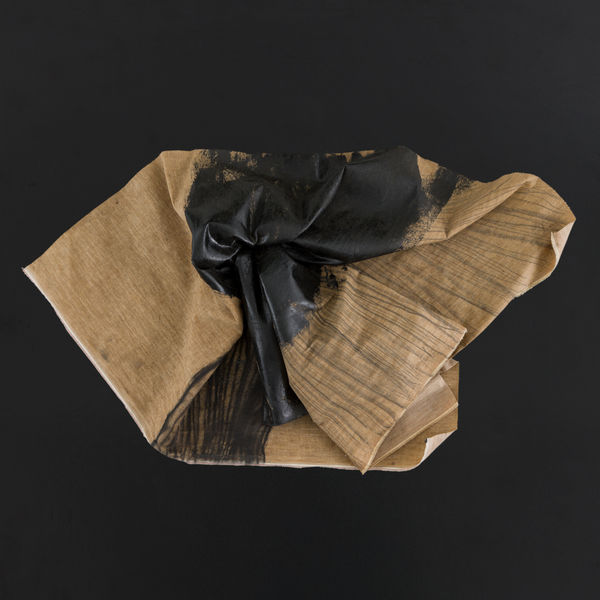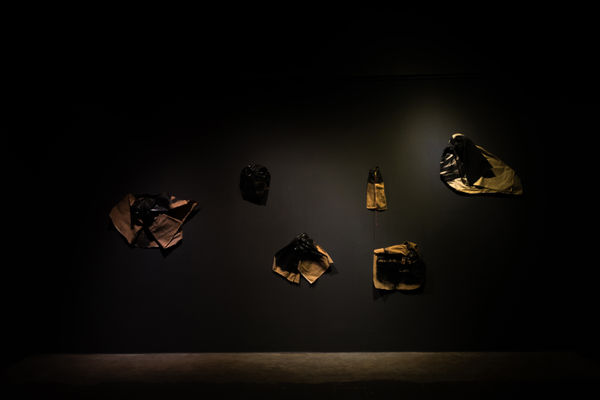MY MAKEUP IS WRONG: Fabienne Francotte
My Makeup is Wrong traverses through the stages of grief, as Fabienne Francotte mines the depths of her psyche in the wake of profound loss. Ink spills from her brush with the controlled precision of a ballet, as diametrically opposing emotions emerge through acts of restraint and release. The exhibition, My Makeup is Wrong, documents the vulnerable process of acceptance that exists within a fragile equilibrium.
Francotte’s practice is situated in her engagement with the process of writing. It is in the intimacy of words that Francotte conceives images. The pressure of the nib against the surface, the interlude between loading ink onto the brush and making a mark on the paper; the pause, the pace, the drag; each becomes a weighted expression. Each gesture becomes an archival record.
The process of writing unfolds as a negotiation of control and letting go which the artist enters into with the material. It is a tussle that leads to a conversation on imperfections and completeness. As the rhythm of the body and the brush determine the form emotions take, the deliberately moulded canvas invites contemplation. On the other hand, tension appears suspended between the folds of the canvas, as the artist instinctively reacts to a brief slip in control in the Un-namable.
Francotte’s emotional world percolates into the work she creates. In the titular series of the exhibition, My Makeup is Wrong, portraits appear as half expressions of a personhood. With closed eyes and tight lips, they remain caught in a chokehold of emotions, as they struggle with the weight of emotions. The frailty of their spirit effuses through the pale tones, held together by thick lines of red and black.
The artist’s contemplation of the frailty of existence takes the form of frayed thread-like streaks in the series, Roots. Running vertically along the length of the canvas they appear disconnected from their origin. The image is reminiscent of a certain disembodiment that is pronounced in the absence of loved ones. The roots slip past the edge of the canvas; essaying the desire to find an anchor.
The artist carries within herself a multitude of lives that have touched her, leaving lasting impressions on her psyche. The indiscernible pain transforms into visceral poetry, giving form to the unsaid, where the ache of memory becomes prose.
-
 Fabienne FrancotteMy Makeup is Wrong 1, 2024Mixed Media on Canvas170 x 115 cm
Fabienne FrancotteMy Makeup is Wrong 1, 2024Mixed Media on Canvas170 x 115 cm
66 7/8 x 45 1/4 in -
 Fabienne FrancotteMy Makeup is Wrong 8, 2024Mixed Media on Board74 x 54.5 cm
Fabienne FrancotteMy Makeup is Wrong 8, 2024Mixed Media on Board74 x 54.5 cm
29 1/8 x 21 1/2 in -
 Fabienne FrancotteMy Makeup is Wrong 5, 2024Mixed Media on Board51 x 38 cm
Fabienne FrancotteMy Makeup is Wrong 5, 2024Mixed Media on Board51 x 38 cm
20 1/8 x 15 in -
 Fabienne FrancotteMy Makeup is Wrong 6, 2024Mixed Media on Board51 x 38 cm
Fabienne FrancotteMy Makeup is Wrong 6, 2024Mixed Media on Board51 x 38 cm
20 1/8 x 15 in
-
 Fabienne FrancotteRelics 2, 2024Mixed Media10 x 20 x 6 cm
Fabienne FrancotteRelics 2, 2024Mixed Media10 x 20 x 6 cm
4 x 7 7/8 x 2 3/8 in -
 Fabienne FrancotteRelics 3, 2024Mixed Media26 x 23 x 15 cm
Fabienne FrancotteRelics 3, 2024Mixed Media26 x 23 x 15 cm
10 1/4 x 9 x 5 7/8 in -
 Fabienne FrancotteRelics 5, 2024Mixed Media20 x 11 x 13 cm
Fabienne FrancotteRelics 5, 2024Mixed Media20 x 11 x 13 cm
7 7/8 x 4 3/8 x 5 1/8 in -
 Fabienne FrancotteThe Unnameable 1, 2024Wall Paint on Canvas34 x 28 x 12 cm
Fabienne FrancotteThe Unnameable 1, 2024Wall Paint on Canvas34 x 28 x 12 cm
13 3/8 x 11 x 4 3/4 in
-
 Fabienne FrancotteThe Unnameable 2, 2024Wall Paint on Canvas50 x 54 x 12 cm
Fabienne FrancotteThe Unnameable 2, 2024Wall Paint on Canvas50 x 54 x 12 cm
19 3/4 x 21 1/4 x 4 3/4 in -
 Fabienne FrancotteThe Unnameable 3, 2024Wall Paint on Canvas52 x 84 x 12 cm
Fabienne FrancotteThe Unnameable 3, 2024Wall Paint on Canvas52 x 84 x 12 cm
20 1/2 x 33 1/8 x 4 3/4 in -
 Fabienne FrancotteThe Roots 2 , 2024Mixed Media on Waxed Japanese Canvas114 x 90 cm
Fabienne FrancotteThe Roots 2 , 2024Mixed Media on Waxed Japanese Canvas114 x 90 cm
44 7/8 x 35 3/8 in -
 Fabienne FrancotteThe Roots 1 , 2024Mixed Media on Waxed Japanese Canvas114 x 90 cm
Fabienne FrancotteThe Roots 1 , 2024Mixed Media on Waxed Japanese Canvas114 x 90 cm
44 7/8 x 35 3/8 in























